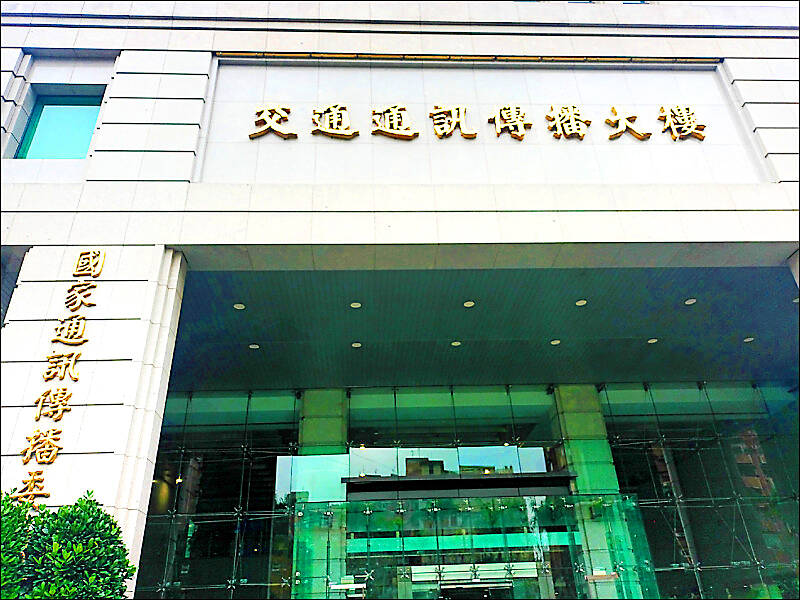Private banks from next month could apply to acquire their own short message service (SMS) codes amid an increase in fraudulent messages sent by people pretending to be from financial institutions, the National Communications Commission (NCC) said yesterday.
The commission recently met with Taiwan’s three largest telecoms to discuss the possibility after the Ministry of Digital Affairs in September last year created the SMS code “111” to identify messages distributed by government-run agencies, including state-run banks, in response to fraudulent messages claiming to be from government agencies.
Lawmakers this week asked whether private banks could also apply to have specific SMS codes to help them tackle fraudulent text messages.

Photo: Taipei Times
“The commission’s position is that private banks can decide whether they want to have their own SMS codes. It should not be a mandate. The commission would be a bridge between the private banks and telecoms, and we would not intervene in their negotiations over details such as the price of distributing text messages,” NCC Vice Chairman and spokesman Wong Po-tsung (翁柏宗) said.
In a meeting with NCC officials, representatives of the three telecoms and SMS distributors reached a preliminary agreement that SMS codes for private banks would consist of five digits: the number 68 and their three-digit bank codes, Wong said.
For example, the bank code for Taipei Fubon Bank is 012, and the SMS code for text messages sent by the bank could be 68012, he said.
“We still need to listen to input from telecoms, the Financial Supervisory Commission, the Ministry of Digital Affairs and the Bankers Association [of the Republic of China],” Wong said, adding that a trial run could be conducted next month.
SMS codes that private banks used would be their one and only number and could not be modified or distributed via non-relevant third parties, Wong added.

Taiwanese can file complaints with the Tourism Administration to report travel agencies if their activities caused termination of a person’s citizenship, Mainland Affairs Council Minister Chiu Chui-cheng (邱垂正) said yesterday, after a podcaster highlighted a case in which a person’s citizenship was canceled for receiving a single-use Chinese passport to enter Russia. The council is aware of incidents in which people who signed up through Chinese travel agencies for tours of Russia were told they could obtain Russian visas and fast-track border clearance, Chiu told reporters on the sidelines of an event in Taipei. However, the travel agencies actually applied

Japanese footwear brand Onitsuka Tiger today issued a public apology and said it has suspended an employee amid allegations that the staff member discriminated against a Vietnamese customer at its Taipei 101 store. Posting on the social media platform Threads yesterday, a user said that an employee at the store said that “those shoes are very expensive” when her friend, who is a migrant worker from Vietnam, asked for assistance. The employee then ignored her until she asked again, to which she replied: "We don't have a size 37." The post had amassed nearly 26,000 likes and 916 comments as of this

New measures aimed at making Taiwan more attractive to foreign professionals came into effect this month, the National Development Council said yesterday. Among the changes, international students at Taiwanese universities would be able to work in Taiwan without a work permit in the two years after they graduate, explainer materials provided by the council said. In addition, foreign nationals who graduated from one of the world’s top 200 universities within the past five years can also apply for a two-year open work permit. Previously, those graduates would have needed to apply for a work permit using point-based criteria or have a Taiwanese company

The Shilin District Prosecutors’ Office yesterday indicted two Taiwanese and issued a wanted notice for Pete Liu (劉作虎), founder of Shenzhen-based smartphone manufacturer OnePlus Technology Co (萬普拉斯科技), for allegedly contravening the Act Governing Relations Between the People of the Taiwan Area and the Mainland Area (臺灣地區與大陸地區人民關係條例) by poaching 70 engineers in Taiwan. Liu allegedly traveled to Taiwan at the end of 2014 and met with a Taiwanese man surnamed Lin (林) to discuss establishing a mobile software research and development (R&D) team in Taiwan, prosecutors said. Without approval from the government, Lin, following Liu’s instructions, recruited more than 70 software